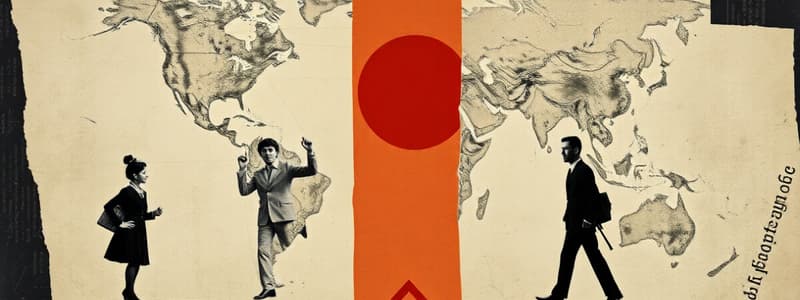Podcast
Questions and Answers
[Blank] is a relatively new concept that explains humans' and civilizations' capacity to adapt to new and changing surroundings via cultural adaptations.
[Blank] is a relatively new concept that explains humans' and civilizations' capacity to adapt to new and changing surroundings via cultural adaptations.
Cultural adaptation
[Blank] refers to the psychological disorientation that most people experience when they are exposed to a culture different than their own for an extended period of time.
[Blank] refers to the psychological disorientation that most people experience when they are exposed to a culture different than their own for an extended period of time.
Culture shock
The sense of meaning in life is made up of which essential components: Identity, Self-worth, Competence, ______, and Belonging
The sense of meaning in life is made up of which essential components: Identity, Self-worth, Competence, ______, and Belonging
Security
Culture shock is not the result of a single occurrence, but rather it builds up over time and results from the process of learning new ways of seeing, thinking, and ______.
Culture shock is not the result of a single occurrence, but rather it builds up over time and results from the process of learning new ways of seeing, thinking, and ______.
Adaptation became more popular in the second half of the 1990s as a result of behavioral flow, behavioral composites, and other ______
Adaptation became more popular in the second half of the 1990s as a result of behavioral flow, behavioral composites, and other ______
In the ______ stage of cultural adaptation, the individual may begin to compare aspects of their new life to their previous life.
In the ______ stage of cultural adaptation, the individual may begin to compare aspects of their new life to their previous life.
During the Reintegration/Irritation and Hostility stage, individuals will remain patient for a few days before returning to their ______ when the distance is short.
During the Reintegration/Irritation and Hostility stage, individuals will remain patient for a few days before returning to their ______ when the distance is short.
During the ______ stage of cultural adaptation, a person's mentality must change in order to adapt to the difficulties faced abroad.
During the ______ stage of cultural adaptation, a person's mentality must change in order to adapt to the difficulties faced abroad.
After the shocks of the second culture, they finally have two cultures, People who have been to two or more cultures are multicultural, in the end, ______.
After the shocks of the second culture, they finally have two cultures, People who have been to two or more cultures are multicultural, in the end, ______.
[Blank] is defined as the awareness, knowledge, skills, practices, and processes needed to function effectively and appropriately in culturally diverse contexts.
[Blank] is defined as the awareness, knowledge, skills, practices, and processes needed to function effectively and appropriately in culturally diverse contexts.
Systemic cultural competence requires proper ______, monitoring mechanisms, and sufficient resources to encourage culturally competent behavior and practice at all levels.
Systemic cultural competence requires proper ______, monitoring mechanisms, and sufficient resources to encourage culturally competent behavior and practice at all levels.
To guarantee cultural competence, explain key ______ as needed.
To guarantee cultural competence, explain key ______ as needed.
Improved understanding of our own culture and ability to convey it to others an example of Cultural ______.
Improved understanding of our own culture and ability to convey it to others an example of Cultural ______.
Improved control and competence in cross-cultural relationships is an example of ______
Improved control and competence in cross-cultural relationships is an example of ______
People can understand one another and have a higher level of confidences in one another with ______.
People can understand one another and have a higher level of confidences in one another with ______.
Improved listening and communication abilities are examples of which skill? [Blank]
Improved listening and communication abilities are examples of which skill? [Blank]
Learning, effective communication, compatibility, and adaptability are examples of the four pillars of ______.
Learning, effective communication, compatibility, and adaptability are examples of the four pillars of ______.
When both parties in an intercultural encounter learn and utilize cross-cultural communication skills, we meet as equals in a ______
When both parties in an intercultural encounter learn and utilize cross-cultural communication skills, we meet as equals in a ______
We must broaden our knowledge and awareness of diversity, but we must also realize that when dealing with or managing diversity, we are dealing with ______, not categories.
We must broaden our knowledge and awareness of diversity, but we must also realize that when dealing with or managing diversity, we are dealing with ______, not categories.
Assist immigrants in assimilating into the society; involve them in the communication process; work with ______
Assist immigrants in assimilating into the society; involve them in the communication process; work with ______
Flashcards
Cultural Adaptation
Cultural Adaptation
A relatively new concept explaining humans' and civilizations' capacity to adapt to changing surroundings.
Culture Shock
Culture Shock
Psychological disorientation experienced when exposed to a culture different from one's own for an extended period.
Honeymoon Stage
Honeymoon Stage
The initial, exciting phase of learning about a new culture. Everything seems fresh and fascinating.
Disintegration
Disintegration
Signup and view all the flashcards
Reintegration
Reintegration
Signup and view all the flashcards
Autonomy/ Adjustment
Autonomy/ Adjustment
Signup and view all the flashcards
Independence
Independence
Signup and view all the flashcards
Cultural competence
Cultural competence
Signup and view all the flashcards
Cultural Self-Awareness
Cultural Self-Awareness
Signup and view all the flashcards
Confidence
Confidence
Signup and view all the flashcards
Mutual Knowledge
Mutual Knowledge
Signup and view all the flashcards
Interpersonal Skills
Interpersonal Skills
Signup and view all the flashcards
Functional fitness
Functional fitness
Signup and view all the flashcards
Intercultural identity
Intercultural identity
Signup and view all the flashcards
Study Notes
Cultural Adaptation
- Cultural adaptation is a relatively new concept
- It explains the capacity of humans and civilizations to adapt to changes in natural and social environments through cultural adaptations
- Culture changes can range from minor changes in livelihood systems to major transformations of the entire cultural system
Culture Shock
- Culture shock is the psychological disorientation that people experience when exposed to a different culture for an extended time
- Cultural differences can undercut or threaten one's sense of purpose in life
- A sense of meaning in life is made up of identity, self-worth, competence, security, and belonging
- Contact with unfamiliar ways of doing things and social signals can undermine these components, leading to anxiety, fatigue, negative emotions, discomfort, incompetence, and confusion
- Culture shock builds over time and results from learning new ways of seeing, thinking, and acting
Cultural adaptation in contemporary behavioral study
- A major focus across various fields like psychology, archaeology and anthropology
- Research focuses on behavioral systems as a model for interactions between human behavior and natural environment components
- Cultural adaptation gained popularity in the second half of the 1990s due to behavioral selection and flow
Stages of Cultural Adaptation
- Honeymoon/Contact Stage: Initial stage of learning about a new culture with excitement and fascination. Issues aren't viewed negatively and there's no direct contact with local communities
- Disintegration and Disorientation: The new environment triggers culture shock; frustrations surface as comparisons to the previous way of life emerge
- This can lead to sleep disorders, adapting to a new food system, robberies and housing problems
- It can also lead to loneliness, anxiety, disappointment, boredom, cognitive exhaustion, anger, stress, and the desire to return home
- Reintegration/Irritation and Hostility: Stage is influenced by individual personality and length of stay
- People may remain patient for a brief time before returning to their original location, because they are struggling to cope with this new culture
- Autonomy/Adjustment and Integration: Requires a change to your mentality, overcome difficulties, develop an integration strategy, manage and resolve issues, and finding a sense of belonging
- Independence/Biculturality: Requires individuals to return to their home town and rethink their original practices and discover that some have been altered or reduced
Cultural Competence
- Cultural competence is defined as the awareness, knowledge, skills, practices, and processes needed to function effectively and appropriately in culturally diverse contexts
- It's a lifelong learning process involving personal and organizational cross-cultural experience, language acquisition, training, and education
- Without cultural competence and awareness, you may be at a disadvantage
Levels of Cultural Competence
- Systemic cultural competence requires proper norms, procedures, monitoring mechanisms, and sufficient resources to encourage culturally competent behavior and practice at all levels
- Cultural competence in the workplace requires the skills and resources to satisfy a variety of customers, and also a corporate culture that fosters, develops, and evaluates cultural competency as a core business function
- Professional cultural competence is founded on education and professional development, and cultural competence standards are required to guide individuals in their work lives
- Individual cultural competence requires the maximum of knowledge, attitudes, and behaviors inside a company, allowing individuals to cooperate with a diverse variety of colleagues and customers
- Individual and team cultural competence is a continual process of learning about cultures, cultural adaptation, and cross-cultural communication
- Cultural competence must be guaranteed with the following:
- Plan ahead of time and discover various civilizations and cross-cultural relationships
- Be aware of your own cultural beliefs, expectations, and biases
- Explain key differences as needed
Additional actions to take
- Assist immigrants in assimilating into the society
- Involve immigrants in the communication process
- Work with ethnic groupings
Benefits of Cultural Competence
- Cultural Self-Awareness: A better understanding of our own worldviews and how we come to hold them; Improved understanding of our own culture and ability to convey it to others.
- Confidence: Improved control and competence in cross- cultural relationships, there is less tension and uncertainty in complex situations
- Mutual Knowledge and Openness: People who understand one another better have a higher level of confidence in one another, increased cultural awareness leads to greater openness to various points of view and more creative problem-solving
- Interpersonal Skills: Improved listening and communication abilities, improved ability to build bridges between people from different cultures, as well as establish and sustain good relationships and collaborations
- Functional Fitness: Learning, effective communication, compatibility, and adaptability
- Discovering a 'Third Culture': Discovering the 'third culture' via intercultural identity
- When both parties in an intercultural encounter learn and utilize cross-cultural communication skills, meeting as equals in a “third culture.”
- Must realize that when dealing with or managing diversity, we are dealing with individuals, not categories
Studying That Suits You
Use AI to generate personalized quizzes and flashcards to suit your learning preferences.




